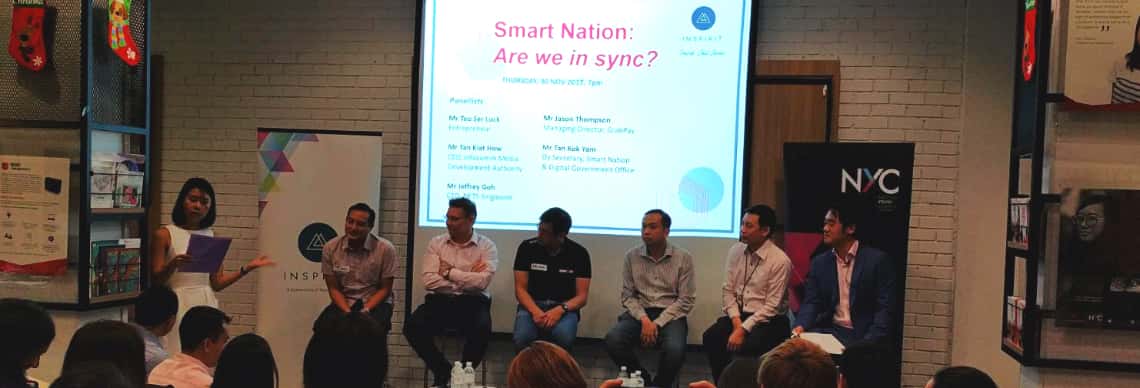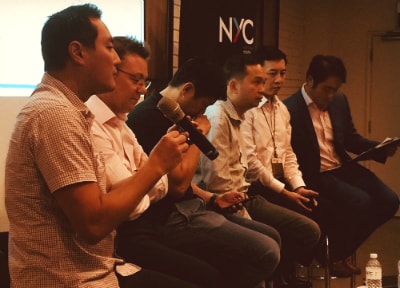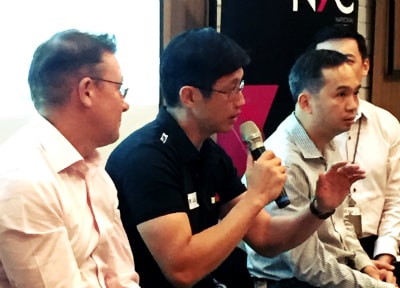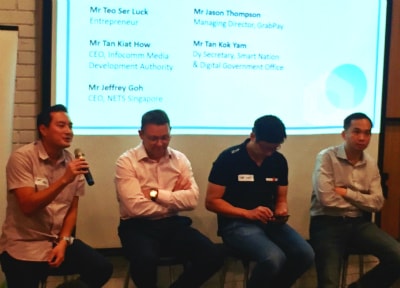Smart people are key to a Smart Nation, and everyone plays a role in ensuring that technology is used meaningfully to make the lives of citizens better.

.gif?h=100%&w=100%&hash=9258F7DC971238F1B0A70FA2F250659D)
Singapore is rapidly transforming into a digital economy, but there are still segments of society who are intimidated by digitalisation, and feel that they cannot keep up.
An important issue, therefore, is human capital. “In addition to technologies, a Smart Nation needs smart people too. It has to encompass every Singaporean,” said Mr Jeffrey Goh, CEO of NETS Singapore.
Mr Goh was speaking on 30 November 2017 at a panel discussion organised by the National Youth Council (NYC), titled “Smart Nation: Are we in sync?”. It is part of NYC’s INSPIRIT Fireside Chat series.
The panel – moderated by Mr Ashley Tan, associate director at Deloitte Consulting and a member of NYC’s INSPIRIT community of youth leaders – focused on gaps and opportunities associated with Singapore’s Smart Nation vision, as well as how individuals, businesses and government agencies can work together to achieve this vision.
Besides Mr Goh, other panellists included Mr Tan Kiat How, CE of the Infocomm Media Development Authority (IMDA); Mr Tan Kok Yam, deputy secretary of the Smart Nation and Digital Government Office (SNDGO); Mr Teo Ser Luck, entrepreneur and MP for Pasir Ris-Punggol GRC; and Mr Jason Thompson, GrabPay’s managing director.
It's about people

“To me, Smart Nation is a movement,” said Mr Tan Kiat How. “It is not solely led by the Government or the private sector – rather, everyone has a role to play in being an agent of change.” He cited the example of the Digital Clinic session held at Heartbeat@Bedok – organised by the South East Community Development Council and IMDA – where corporate volunteers taught senior citizens to use their smartphones and apps such as WhatsApp and MyTransport.SG.
“These might not be very difficult technologies,” Mr Tan Kiat How added. “But this is what Smart Nation is about – using technology meaningfully to transform and change someone’s life, and make it better.”
Mr Tan Kok Yam highlighted the “3Ls” of the Smart Nation movement – (i) Liveability (ii) Livelihood and (iii) Living together – all of which centre around people.
To fulfil the first “L”, the Smart Nation project has to make Singapore a place that people want to live in, he said. With the digital revolution happening on a global scale, Singapore needs to carve out a space for itself in a highly competitive market to ensure the second “L” – the livelihood of its people.
This can be done by creating products that are relevant not just to Singapore but to the world, as well as remaining attractive to investors.
From an entrepreneur’s point of view, Mr Teo shared that while Singapore has the capacity to conduct research and produce tech-related innovations, human capital remains a critical constraint and should not be neglected in the larger scheme of development.
He suggested that venture capitalists and entrepreneurs invest resources in people and productivity enablers to maximise the impact and value of the Singaporean workforce. By channelling funds towards upgrading the skills of workers and implementing software that makes processes more efficient, Singapore can remain an attractive location for investment.
The final “L” – living together – is the most intangible yet most important of the three, said Mr Tan Kok Yam, adding that the digital platforms for Smart Nation must be used to bring people together, so that those with the knowledge and energy to contribute to society are able to do so effectively.
What makes us tick?

While there has been an aggressive push towards e-payments in Singapore, cashless payments have yet to take off in a big way. But when it comes to adopting digital technology, every country’s situation is different, said Mr Goh. “Every country is unique, and you have to understand what makes citizens tick,” he explained.
In China, counterfeit notes are common, and ATMs are not as conveniently located as they are in Singapore. Smartphone-enabled payment services have thus become immensely popular there for its convenience, Mr Goh added.
“But that is not to say that people in China don’t value safety or security. It’s just that they value convenience more. On the other hand, the situation in Singapore is the reverse,” he said, adding that kiasu (which means “fear of losing out to others”) Singaporeans would first and foremost be concerned about the security of payment methods.
Mr Teo stressed, however, that technologies shouldn’t be adopted for the sake of outdoing other countries. “It shouldn’t be about implementing certain technologies just because other smart cities, such as Barcelona and Estonia, have them. The point is that we have be selective, because the demographics as well as lifestyles of Singaporeans are very different.”
“Smart Nation technologies do not have to be deep tech. At the end of the day, they just have to be simple enough to make sure that everyday lives are made better,” Mr Teo added.
It’s all in the mindset

The panel also agreed that the Smart Nation movement is more than just the technologies driving it.
“Digital transformation was never about the ‘digital’ – it’s about business transformation, which at the end of the day, is about mindset changes,” said Mr Tan Kiat How.
Having the right mindset also applies to the Government, he added. “It’s not just about the technical skill sets, but also the mentality. We need to have the humility and open-mindedness to learn from mistakes and from the other players in the ecosystem,” Mr Tan Kiat How said.
Mr Thompson said that the private sector can play an important part in this ecosystem by helping to streamline everyday processes that seem complicated.
“In Grab, we saw a lack of safe, convenient and affordable transport options, and we moved in to solve those problems one small step at a time. We’ve now brought that same approach to the challenge of cash in Singapore,” Mr Thompson said. “By simplifying the whole equation, we can end up playing a rich role in the Smart Nation journey.”
Mr Tan Kiat How felt that the Government could learn from the start-up approach to innovation and solving problems. “The most innovative companies that can think out of the box are start-ups and the Government has a lot to learn from them – they are where the future might be,” he concluded.
This article was adapted from 'The Smart Nation movement needs smart people' originally published by GovTech TechNews, and reproduced with permission.


.webp)